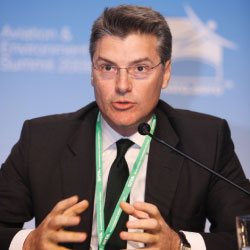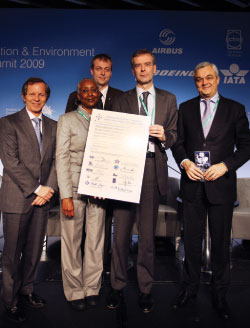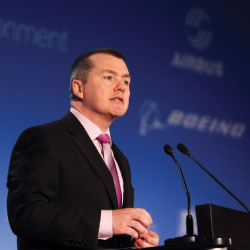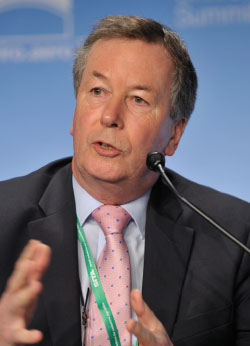
Dr Yiannis Paraschis, ACI EUROPE President and CEO of Athens International Airport: “As an industry, measures that need to be advanced include infrastructure, operational, technical and balanced economic measures. A combination of measures – such as Airport-Collaborative Decision Making (A-CDM) and the Single European Sky (SES) – will bring short-term improvements rather than technology.”
The Summit clearly demonstrated that the environment remains at the top of the agenda, alongside safety and security, despite the industry experiencing the worst economic conditions in its history. Significantly, the Summit witnessed the launch of a joint action plan by ACI EUROPE, CANSO, EUROCONTROL and IATA, which is designed to reduce CO2 emissions by aircraft in Europe by 500,000 tonnes per year. The join action plan is about introducing more widespread use of Continuous Descent Approach (CDA) and the plan will be implemented at up to 100 European airports by the end of 2013.
Olivier Jankovec, Director General, ACI EUROPE, said: “Our cooperation will address crucial short-term and long-term challenges for European aviation. CDA will benefit residents living around many European airports by lowering noise and carbon emissions, saving airlines money at a time when every cent counts – a rare win-win, in an increasingly challenging operating environment.”
CDA will produce major benefits in terms of fuel burn (a 50-150kg reduction for short-medium haul aircraft), CO2 emissions (a 160-470kg reduction per flight), and noise (a reduction of between one and five decibels around the airport). The figures are impressive – with CDA in place at 100 airports, airlines will save 150,000 tonnes of fuel and €100 million per year, as well as achieving the CO2 reduction of 500,000 tonnes.
Lex Hendriks, deputy director Network Development, EUROCONTROL, said: “This action plan is yet another demonstration of how seriously the aviation community takes the need to reduce the environmental impact of flying. It is a good example of what can be achieved when a number of organisations work together in partnership, sharing good practice, and is an early deliverable for the SESAR programme to which so many of us are committed.”

The Summit witnessed the launch of a joint action plan by ACI EUROPE, CANSO, EUROCONTROL and IATA, which is designed to reduce CO2 emissions by aircraft in Europe by 500,000 tonnes per year. It will see Continuous Descent Approach (CDA) implemented at up to 100 European airports by the end of 2013.
Communications Challenge

The Summit witnessed a global agreement on the introduction of performance-based navigation, which brings together 19 partners from all sections of the industry to optimise operational procedures that reduce fuel burn and lower emissions.
A key message was the need for aviation to communicate that it is part of the solution to environmental challenges, not the source of the problem. The industry inspires innovation and is leading the way in CO2 reduction and the development of biofuels. “We have a great story to tell, but don’t tell it well enough,” was how Chet Fuller, chief marketing officer, GE Aviation, put it.
Brian Conway, head of government and industry affairs, Manchester Airports Group, stressed that despite the economic climate, budgets spent on communications should not be cut; that would, he said, “undermine what we are trying to do”.
Conveying a common message is essential for greater impact. “Having common standards is key as it shows everyone is on the same page,” said Conway. “Manchester Airports Group is championing a common approach on carbon accreditation and ACI EUROPE is launching its common framework ‘Airport Carbon Accreditation’ at its Annual Assembly in Manchester – providing a real opportunity for the industry to speak collectively.”

Willie Walsh, CEO, British Airways, called for a global sectoral approach. “We have got to get politicians to realise that a global problem needs a global solution.”
Airports are perhaps in a unique position among industry stakeholders as they are the ‘face’ the public sees. As Conway put it: “Airports are close to the people who can support you, but also close to those who don’t like you.” He explained that it is important for airports to communicate to the public why they want to undertake infrastructure projects: “We realised that to be able to install the first wind turbines at an airport in the UK (at East Midlands), we needed third party support onboard. We produced a four-page document to answer questions about the project, before being asked. It was a tool to engage with the people around us. It is vital to obtaining the license to grow.”

Brian Conway, head of government and industry affairs, Manchester Airports Group: “Manchester Airports Group is championing a common approach on carbon accreditation. ACI EUROPE is launching Airport Carbon Accreditation providing a real opportunity for the industry to speak collectively.”
In December 2006, Virgin Atlantic Airways began making a conscious effort to highlight what the industry is doing to mitigate its environmental impact. “Things that are being done include Continuous Descent Approach (CDA) and taxiing on one or two engines – the philosophy was to get the industry talking about what it is doing. We focused on technology that is coming into the industry,” said Paul Charles, director of communications.
In February 2008, Virgin Atlantic, working with Boeing and GE Aviation, conducted the first commercial aviation flight using a sustainable biomass-to-liquid fuel mixed with traditional kerosene-based jet fuel. “It was important to show that a flight at 30,000ft can be done on biofuel. We’ve come a long way over the last year. Three other airlines have done tests – Air New Zealand, JAL and Continental. We believe in five years we will see biofuel being used,” said Charles.
GE Aviation’s ‘ecomagination’ initiative is designed to communicate the work that is being done to minimise the environmental impact of its products. “The message is a very public message about using our technology for solving problems – fuel efficiency, for example,” said Fuller. The emphasis is on maximising fuel efficiency and minimising greenhouse gas emissions. “It is a very public message about a product sold to a few people around the world. We have a goal to reduce the greenhouse gas intensity of our products by 30% over 2004 levels by 2012,” said Fuller.
Airport Carbon Accreditation
Dr Yiannis Paraschis, ACI EUROPE President and CEO of Athens International Airport, participated in the final Executive Panel session. He outlined details of the ACI EUROPE’s forthcoming Airport Carbon Accreditation. “Carbon neutrality is the vision for the European airport community. Airport Carbon Accreditation will allow airports to work towards this by following a common framework for the measurement, reporting and reduction of carbon emissions,” said Paraschis. Six airports – Dubrovnik Airport, Frankfurt Airport, Malta Airport, Manchester Airport, Amsterdam-Schiphol and Umea Airport (Sweden) – participated in the pilot phase from October 2008 to January 2009 and the scheme is being formally launched at the ACI EUROPE Annual Assembly in Manchester.
“As an industry, measures that need to be advanced include infrastructure, operational, technical and balanced economic measures. A combination of measures – such as Airport-Collaborative Decision Making (A-CDM) and the Single European Sky (SES) – will bring short-term improvements rather than technology,” said Paraschis.
Angela Gittens, Director General, ACI World, commended the development of Airport Carbon Accreditation and explained that ACI World is also producing a compendium of best practices. “We continue to seek tools that will enable the long-term growth of air travel,” she said.
James Cherry, Chairman, ACI World and President and CEO, Aéroports de Montréal, similarly stressed the great collaboration taking place between members of the aviation community. “In North America, we are seeing the same kind of cooperation as in Europe,” he said.
Willie Walsh, CEO, British Airways, called for a global sectoral approach. “We have got to get politicians to realise that a global problem needs a global solution. Aviation is a global industry; this is a global challenge,” he said.
Tangible emissions reductions
Since the 2008 Aviation and Environment Summit, the industry has been working at an unprecedented pace to reduce its emissions and consensus at the Summit was for the need to adopt a global sectoral approach and communicate a common message on the efforts the industry is making to reduce its environmental impact. Delegates recognised the important work that all industry sectors and governments must undertake prior to the UNFCCC (United Nations Framework Convention on Climate Change) climate change negotiations in Copenhagen in December. Significantly, the Summit was marked by the launch of a joint action plan by ACI EUROPE, CANSO, EUROCONTROL and IATA, which is designed to reduce CO2 emissions by aircraft in Europe by 500,000 tonnes per year. It also witnessed a global agreement on the introduction of performance-based navigation, which brings together 19 partners from all sections of the industry to optimise operational procedures that reduce fuel burn and lower emissions. Both announcements highlight how cross-industry collaboration can deliver tangible emissions reductions.







